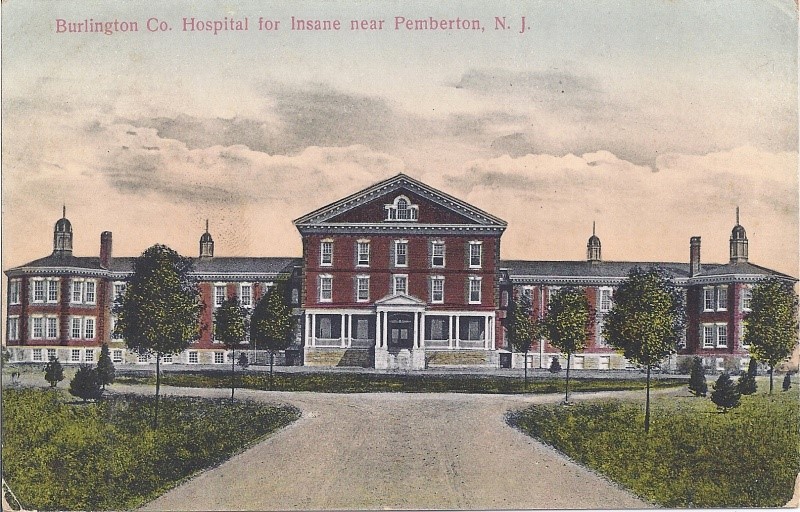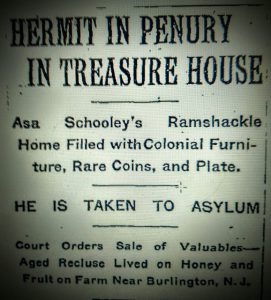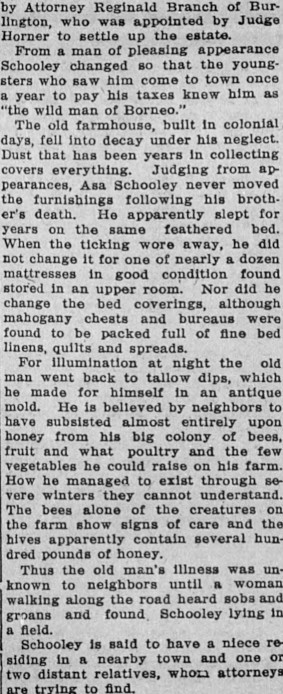
His name, Asa Schooley, seemed to jump out at me. It was a name I hadn’t been searching for, but there he was in black and white newsprint, clinging to his little spot on the back page of time.[1] The details of how I got to Asa in the first place probably aren’t all that important, but suffice it to say I’d started out looking for someone else’s obituary – that of another Mr. Schooley.[2] But like the rest of us I’d found myself stumbling upon a “rabbit hole,” this particular one belonging to Asa. (I’m a bit embarrassed to tell you that I never did find the obit. I had been looking for.) Asa’s sad life, lacerated with circumstance, caught me off guard, prompting me to look further for facts and answers – a search with still much left to uncover.

Asa, a cousin to my great-great-grandmother Hester (Schooley) Record,[3] was the son of Asa Schooley Sr. (ca. 1801–1883) and his wife Susan (Ivins) Schooley (ca. 1801–ca. 1875). Asa, his parents, a brother Joseph, and three sisters lived in what has been described as “a ramshackle an old country house” in Florence, Burlington County, New Jersey. Here the Schooley family maintained a farm along a highway running between Philadelphia and New York.[4]
Asa’s family, prosperous at one time, seems to have undergone a natural sort of attrition after Asa’s parents passed away. Asa’s sisters married, and in 1897 all three sisters passed away within a few short months of one another. By 1900, Asa and his brother Joseph were alone at the farm with one surviving niece, Hannah, but even this wouldn’t last.
 Contemporaries described Asa Jr. as one of Burlington County’s “Beau Brummells.”[5] However, the handsome looks of the Schooley boys don’t seem to have done either Asa or his brother Joseph much good, as they are further described as having been “unlucky in love” – so unlucky that they became isolated and alone from the rest of the world. Asa however gets the worst of it, losing his brother Joseph to death in 1901 and his niece Hannah (Telley) Freeman to marriage that next year. By 1902 Asa is isolated, clinging to memories – and a tenuous sanity.
Contemporaries described Asa Jr. as one of Burlington County’s “Beau Brummells.”[5] However, the handsome looks of the Schooley boys don’t seem to have done either Asa or his brother Joseph much good, as they are further described as having been “unlucky in love” – so unlucky that they became isolated and alone from the rest of the world. Asa however gets the worst of it, losing his brother Joseph to death in 1901 and his niece Hannah (Telley) Freeman to marriage that next year. By 1902 Asa is isolated, clinging to memories – and a tenuous sanity.
Asa’s life, his encroaching disabilities, and the reasons behind his growing periods of isolation between 1901 and his demise in 1912 have been difficult to ascertain. One starting point in the reduction in Asa’s mental health is the report that he battled with local authorities about relinquishing his brother Joseph’s body for burial. This first mentioned “trigger event” gives a murky snapshot of Asa’s mental health at the start of 1902.
Another account of Asa’s behavior during this time period comes from the local children. The children became “wide eyed” by his “strange appearance” on visits to town to pay his taxes, labeling him “the wild man of Borneo.” The local people said that during this time he had little interaction with anyone else and never purchased any goods or supplies for the house or farm.
By 1912, as hard as it is to believe, accounts of his life indicate that none of the locals remembered that he was still living at the farm – few (save the tax man or census taker) knew of anyone living there. It is interesting to me that in the span of ten years or so, Asa managed to hide himself away from the rest of the world – and the world let him do so – allowing Asa’s isolation to carry him well past average eccentricity.

Asa continued to live in the old house subsisting on wild honey and what vegetables he was able to grow. It wasn’t until one day in 1912, when Asa’s cries for help were heard on a Burlington highway by a woman passing by, that things would change. Asa, ill and in need of medical care, had managed to drag himself through the undergrowth and out to the road. The locals finally noticed Asa, who was in desperate need of help. By then it was thought his condition was too deteriorated for him to make any sort of recovery or return to normal life. Presumably, this caused county administrators to believe that they had no choice but to exile Asa Schooley to an asylum.
I’m not entirely sure that anyone ever actually tried to help Asa – to help him climb out of what must have been a difficult mental illness. Asa’s house and farm were reported to be quite valuable (almost a time capsule), containing many coins and untouched antiques. It might have simply been easier to seize Asa Schooley’s assets (when Asa needed them most) and give him over to the state – in preference to providing private medical care to get him back on his feet.
Asa Schooley looks to have died intestate in the New Jersey asylum at New Lisbon later in 1912, though the exact “when” of it all is vague. (I am still looking for a record of his death and his final resting place.) I am reminded that in today’s world, Asa might prove to be anyone suffering from mental illness that we might “not see” as we make our way down our own highways; he is someone who, at first glance, we might discount for any number of reasons. This “Hermit’s Tale,” one of isolation and mental illness in the midst of a family’s wealth and history, makes me realize how much more we have to learn and understand regarding diseases like Asa’s – indeed, how very far we have yet to go. Rest in peace, Asa – a peace you well deserve.
Notes
[1] Asa Schooley Jr. (ca. 1843–ca. 1912).
[2] Judge Levi A. Schooley (1841–1908).
[3] Hester Ann (Schooley) Record (1860–1942).
[4] Aurora Democrat, Aurora, Colorado, 16 August 1912.
[5] The New York Times, 14 July 1912.
Hi Jeff,
Were Hester and her cousin Asa descendants of Thomas Schooley (d. between 6 Feb – 13 Apr 1724 in Chesterfield, Burlington County, NJ) and his wife Sarah Parker who were married in 1686 in Burlington County?
Jan
Hi Janet, Yes! Both were certainly kin to the same family of Schooleys. I’ve used “Trails of Our Father’s” by James Bertram Schooley as my cautionary reference guide for the family – but yes, looks to be of the same New Jersey Schooleys. Many thanks for asking! 🙂
What a sad story. Another interesting, well-written piece.
So sad! Society failed him, and took advantage by neglect.
You write so sympathetically about a poor stranger. I see by his birth information that he would have been the right age to have fought in the Civil War. Did he suffer from PTSD? He is a very interesting person, with a very intriguing story.
Linda – I too have wondered about PTSD as a draft record does show up for Asa, but I haven’t researched whether or not he actually served. It would really be interesting to know what the “root cause” of his mental health issues were. He seems to have had some pretty strong OCD tendencies, and unnfortunately perhaps that combined with some form of dimentia just caught up with him. Asa’s story just caught my eye – so much of this sort of pain in the world, then and now, and still not enough answers.
– Thanks for considering Asa and suggesting PTSD as a possibilty! I appreciate it.
Thank you for writing this heartbreaking story.
It is such a timely piece given the increasingly serious problem of homelessness and mental illness we face all over the country now.
I can’t help but wonder why his estate, which sounds as if it would have produced enough money to care for him in a high quality private hospital, was not used to his benefit.
How much of the estate’s realized value went into the pockets of the attorneys and public officials who placed him in a public asylum, terrible and violent places in the early 1900’s, rather than acting as financially ethical representatives for his benefit?
Asa, may you be resting in blessed peace.
You have brought up my very questions about how Asa’s estate must have been manipulated. I haven’t seen any evidence where his niece Hannah benefited in anyway from the sale of the property, coins, or antiques. There also looks to have been other more distant family members – but I can only hope they were innocent in what they may or may not have been told about what they could do for Asa, and that they acted as resposibly as they could. I appreciate your caring about Asa – he’s story sure got to me. Many thanks!
A sad comment on society. We MUST watch out for one another so this is not repeated. My heart hurts for him and the emotional pain he must have felt. I hate to think that somebody who is in such need was just shipped off the the asylum and not given every benefit his fortune could have afforded him.
Jeff, I will see if I can get any more information from my Schooleys in Buffalo. I’m pretty sure they told me they are descendants of the Asa listed in the TRAILS OF OUR FATHERS. I am so glad you dug up this story about Asa–I had not developed any further information on that branch of the family –this is sad . Heart aches.
Nicely written piece, and we’ll researched. It’s great that Asa will now be remembered, and hopefully not lost in his death as he was in life. Everyone should be remembered in some way.
A well written, compassionate story, Jeff. Once again, I learned from you the interesting stories of our ancestors .Thank you, big brother Jeff!
Jeff,
What a sensitively written story about a man who suffered from at best benign neglect. Neglect really is never benign, is it? Even if he didn’t actually serve in the Civil War, it sounds like the death of his brother, who was the closest of his family members, could well have triggered PTSD. I had an uncle who was sent to Europe with the Army right after the end of WW II. He never married, and lived with his parents most of the rest of his life. I remember him as very strange. He used to periodically ask my mother to take him to the VA mental hospital, where he would stay for weeks or months at a stretch. In retrospect, I suspect that something he experienced in war-torn Europe triggered what we now know as PTSD. I can find his draft card, and have a couple of letters he sent to his parents before he left the States, but no other records about his service.
Thanks for another fascinating story, even if he wasn’t the Schooley you thought you were looking for.
Doris
Jeff
I always enjoy your Vita Brevis entries. This one is especially sad. I live in Camden County, New Jersey, just south of Burlington County. If there’s anything I can do locally to assist your research, let me know and I’ll see what I can do.
Bob Flanagan
Bob,
You are a true gentleman! Thanks for your kind words and offer – and back at you sir. If I can help you with anything out this way in Northern Cal please count me in.
Sincerest regards,
Jeff
Jeff,
We so benefit by the improved knowledge that has been gained in the last 100 plus years regarding mental illness. We are fortunate that troubled people are not automatically just “locked up” and the key thrown away the way they were back then. We know that some can be helped. Recognizing, diagnosing and treatment of PTSD, in particular, has been a great blessing to many people.
I appreciate your suggestions of our opening our own eyes and getting outside ourselves enough to see and assist those around us that are in need.
Thank you for the touching, compassionate articles you write.
Blessings
Kat